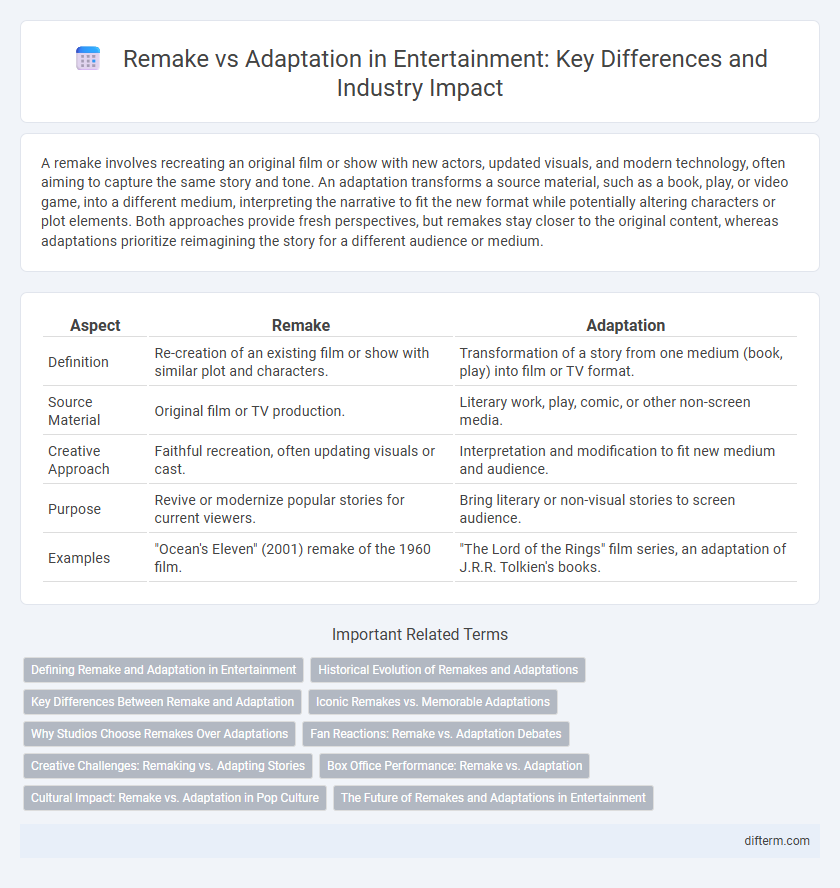A remake involves recreating an original film or show with new actors, updated visuals, and modern technology, often aiming to capture the same story and tone. An adaptation transforms a source material, such as a book, play, or video game, into a different medium, interpreting the narrative to fit the new format while potentially altering characters or plot elements. Both approaches provide fresh perspectives, but remakes stay closer to the original content, whereas adaptations prioritize reimagining the story for a different audience or medium.
Table of Comparison
| Aspect | Remake | Adaptation |
|---|---|---|
| Definition | Re-creation of an existing film or show with similar plot and characters. | Transformation of a story from one medium (book, play) into film or TV format. |
| Source Material | Original film or TV production. | Literary work, play, comic, or other non-screen media. |
| Creative Approach | Faithful recreation, often updating visuals or cast. | Interpretation and modification to fit new medium and audience. |
| Purpose | Revive or modernize popular stories for current viewers. | Bring literary or non-visual stories to screen audience. |
| Examples | "Ocean's Eleven" (2001) remake of the 1960 film. | "The Lord of the Rings" film series, an adaptation of J.R.R. Tolkien's books. |
Defining Remake and Adaptation in Entertainment
A remake in entertainment involves creating a new version of an existing film or television show, often replicating the original storyline, characters, and settings with updated technology or cast. An adaptation transforms source material, such as a book, play, or video game, into a different medium, frequently altering narrative elements to fit the new format's demands. Both processes require creative reinterpretation but differ fundamentally in their approach to the original content's fidelity and purpose.
Historical Evolution of Remakes and Adaptations
Remakes and adaptations in entertainment trace back to early cinema, with remakes often revitalizing classic films by updating storylines and technology to appeal to contemporary audiences. Adaptations transform source material such as novels, plays, or other media into new formats, preserving narrative essence while creatively reinterpreting context, exemplified by Shakespearean plays adapted into diverse genres. The evolution reflects shifting industry priorities and audience tastes, highlighting cultural reinterpretation and technological innovation as key drivers in the cyclical nature of content reproduction.
Key Differences Between Remake and Adaptation
A remake replicates the original work by reproducing its plot, characters, and setting, aiming to update or reimagine it for a new audience or era. An adaptation transforms source material from one medium to another, such as a book into a film, often altering narrative elements to fit the strengths and conventions of the new format. The key difference lies in remakes preserving original content while adaptations reinterpret and modify the story to suit a different artistic medium.
Iconic Remakes vs. Memorable Adaptations
Iconic remakes like "The Lion King" (2019) recreate beloved narratives with modern visuals while preserving core story elements, appealing to both nostalgia and new audiences. Memorable adaptations such as "The Lord of the Rings" trilogy reinterpret literary works by expanding character depth and world-building, creating immersive cinematic experiences. Both forms contribute uniquely to entertainment by balancing reverence for source material with creative innovation.
Why Studios Choose Remakes Over Adaptations
Studios often choose remakes over adaptations because remakes leverage proven storylines with built-in fan bases, reducing financial risk and marketing costs. Remakes allow for updating outdated elements with modern technology while maintaining brand recognition, which appeals to both nostalgic audiences and new viewers. This strategic choice maximizes potential box office returns by capitalizing on familiar intellectual properties compared to the uncertain reception of original adaptations.
Fan Reactions: Remake vs. Adaptation Debates
Fan reactions to remakes often highlight nostalgia and a desire for faithful recreation, while adaptations spark debates over creative liberties taken with source material. Enthusiasts argue remakes sometimes lack originality, whereas adaptations may alienate purists by altering key plot elements. Social media platforms amplify these discussions, fueling passionate divides between audiences favoring authenticity and those embracing innovation.
Creative Challenges: Remaking vs. Adapting Stories
Remaking a story involves recreating an existing narrative with updated elements, often facing the challenge of meeting audience expectations while maintaining originality. Adapting a story requires transforming material from one medium to another, such as a book to film, demanding creative reinterpretation to fit the new format's conventions. Both processes require balancing fidelity to the source with innovative storytelling to engage contemporary viewers effectively.
Box Office Performance: Remake vs. Adaptation
Box office performance often varies significantly between remakes and adaptations, with adaptations generally attracting larger audiences due to established fan bases and original storytelling. Remakes can either capitalize on nostalgia to generate strong initial revenue or struggle if audiences perceive them as uninspired copies. Successful adaptations such as "The Lord of the Rings" trilogy consistently outperform remakes by blending fresh creative vision with beloved source material.
Cultural Impact: Remake vs. Adaptation in Pop Culture
Remakes often replicate original narratives with updated visuals, reinforcing existing cultural touchstones and nostalgia within pop culture. Adaptations transform source material into new formats or genres, introducing diverse cultural elements and expanding the original's context and appeal. The cultural impact of remakes centers on preservation and homage, while adaptations drive innovation and broader cultural discourse.
The Future of Remakes and Adaptations in Entertainment
The future of remakes and adaptations in entertainment hinges on evolving audience preferences and technological advancements like virtual reality and AI-driven storytelling. Studios increasingly leverage data analytics to tailor remakes and adaptations that resonate with diverse demographics, enhancing cultural relevance and market reach. Streaming platforms drive demand for fresh interpretations, blending nostalgia with innovative narratives to sustain viewer engagement and franchise longevity.
remake vs adaptation Infographic

 difterm.com
difterm.com